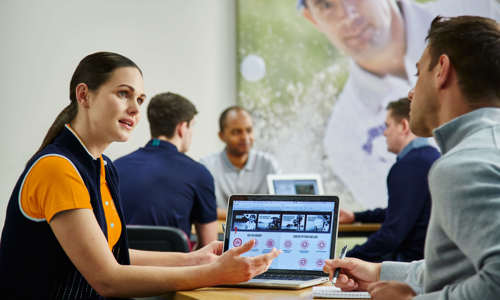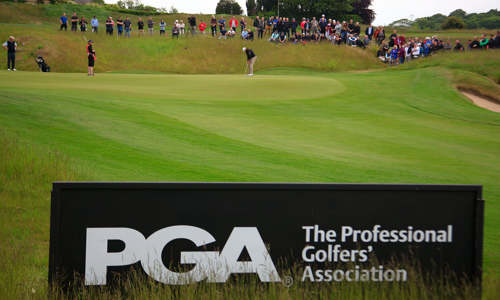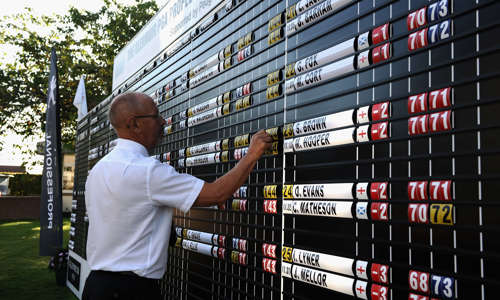The PGA Member stands out as a passionate promoter of both youth and female participation from her base at Bush Hill Park, in North London.
Nicola Bennett is a force of nature. She works tirelessly to open doors for the next generation, and her commitment to championing women in the game highlights her as a beacon of empowerment and change.
Her story is one of breaking barriers, inspiring progress and driving meaningful action in the pursuit of a more inclusive world. Nicola is not only changing the landscape of golf but also paving the way for future generations to thrive in a world where diversity is celebrated and equality is the standard.
Tell us about your journey into golf
It all stemmed from the G.O.A.T. – Tiger. If he hadn’t come on the scene, my dad wouldn’t have been inspired, and I wouldn’t be a professional golfer. It’s literally as simple as that. I think that highlights how important it is to have positive role models that can actually impact people.
When he started playing, my dad and my uncles couldn’t believe that there was a black man playing golf. They took it up themselves, and then my dad tried to get me and Rebecca, my sister, into it. It just gave me the opportunity to be free, experiment and just do things in a group and individually. I found it really rewarding and just fell in love with it almost immediately.
Rebecca didn’t stick with it, but the two of us went to a golf range a couple of years ago. It was the first time Rebecca had picked a golf club up in about 10 years, and she knew how to grip that club straight away. And we were just almost in tears laughing because in Caribbean culture you don’t talk back to your parents or anything like that, and she just remembered how to do that grip from what my dad taught us.
Do you use any coaching technology?
No, I like the Seve Ballesteros vibe! I might put a few alignment sticks out. I use things like cones and tennis balls as targets. I quite like mirrors, because they don’t need to think about anything when they’re over it, they can just naturally see their eyes over the centre lines, then they get that posture right, and they can make sure their swing path is correct, because it stays within the lines. They do naturally use some tech themselves, like when they go to the range, because you’ve got TrackMan everywhere. But I don’t want them to get too lost into numbers because that’s when, for me personally, golf becomes overwhelming, and then it could be a bit unenjoyable. So less tech – I think you don’t need it. Seve didn’t need it, what do we need it for?
What’s it like being based at a club rather than a range?
You’ve got more opportunity to go out and play – I think it’s really important for a client to become familiar with the golf course because when you’re on the range, you’re hitting off a flat lie the entire time, so it’s a bit unrealistic. I think it’s great if you’re doing mechanical work, but when you go on the golf course, the only time you get a flat lie is off a tee box. Most of the time you’re off undulating lies, and I feel like you should reflect that in your training and lessons, so I do as much stuff on the course as possible. I will only use the mats and bays if it’s pouring down.
It’s also really important to practise being in pressured environments, and you experience that pressure when you’re out on the golf course, from having people shout fore or waiting on the tee box for you and lessons. You can become used to all these different experiences on the course. Last year, when the ladies played for the first time after doing the programme, on the final lesson they’re on the golf course, and one of my ladies could barely put the ball on the tee because her hands were shaking. It’s so easy to overwhelm yourself with everything that’s going on, and that’s another reason why everything should be made super simple. Imagine going on the golf course for the first time, and you’re thinking about some swing mechanics, your grip, you’ve got to hit it over there, you’ve got to remember to do a pre-shot routine, you’ve got to keep up the pace of play. It’s easy for it to become a bit too much.
Why is it so important to you to be involved with coaching women?
Honestly, I feel like it’s a life purpose to build these connections. Because golf has been the platform fundamentally for all these women meeting each other. But when you actually experience the bond and see the community that’s built, it’s priceless. Some of these women have been through a lot, whether it’s menopause, cancer, divorce, problems with their kids, whatever, and everyone just becomes so unified through golf. They’re all normal working-class women, and they thought that there were so many limitations in the sport due to financial reasons and stereotypical reasons about golf clubs being snobby, so it is really important for me to break down all those barriers. It’s just the best feeling in the world.
What needs to happen to encourage more black people and people of different ethnicities in to the game?
I think we should reflect and look at what most ethnic minorities like doing. A big part of our culture is music, for example, and some of the world’s leading artists are from different ethnic minorities. Sport is also where our culture lies. It might be a great idea to go outside of golf and do collaborations with people in the music industry, or the acting industry or different sport industries, where you do find people from more diverse cultures, in order to get them involved.
I met Les Ferdinand through golf and he was able to get people into golf and football. DJ Spoony has been able to get a lot of black people to be inspired to play golf through the music industry. I think that’s how we’re going to grow the game. What we can control now within golf is seeing more black and Asian people playing golf and in golf outfits, so that people know straight away, because the power of marketing and the effect that it has on individuals to think ‘I can actually do this, because it’s there, even though it’s not me, it’s not my reflection, I can see it’s for me instantly. That is what draws people in almost immediately. There’s so much power in it.
How do you reach more young people?
It’s so, so, so – times a trillion – important for me to reach young people, because we’re living in a time of such uncertainty and confusion, both financially and in terms of social media and young people not being able to deal with their emotions. It’s great to be able to coach children to play, and also to coach them with life skills. Brendan, who is our incredible Golf Foundation ambassador, is super hands-on. He has helped to form the Unleash Your Drive programme, which gives kids the tools through playing golf to express themselves in the classroom, to calm themselves down when they’re at home, to notice a situation that is developing. I’ve gone to schools all around north London with the Golf Foundation, it’s all funded for them, and I’ve seen young girls go from low-confidence individuals with really low esteem to the other end of the spectrum. We’ve done that through playing golf and giving them all of these life tools that they need.
"I want to utilise my platform to grow the game", Bennett reflects on winning this year’s England Golf Diversity & Inclusion Award, which highlights some of the outstanding work she has done.
The award wasn’t overly important, but what I do is really important to me. I don’t do what I do to try and win awards, I just go to work and really enjoy my job. But to be recognised for something, which I’m doing naturally, with a pure and good intention behind it, was really nice. But it did make me think that I want to try to utilise my platform to grow the game even more, because if I can do it without even trying, then who knows what heights I can take it to. Social media can be a dark tool. I’ve seen it take people’s lives from the pressure, but I’m switching my mindset to how I can utilise this tool in an effective way that’s going to help people. I go on social media when I want to watch things that inspire or uplift me. So I want to view it like that instead.
How did you get into keynote speaking?
I’ve always had a plan in mind from a very young age. I always wanted to play golf professionally, to present and to speak, but I wasn’t sure what level I wanted to speak on, because I always enjoyed watching TED Talks. I feel like I’ve gained a lot of wisdom through different experiences in life, work and business, so I want to rotate my areas around performance, leadership and motivation. I think that the tongue is the most powerful thing to deliver and actually relay a message to individuals, and that’s something that I feel really passionate about, so that’s why I invested in a keynote speaking course.
What do you hope to achieve in your career?
I really want to be able to deliver a strong message and create change in people’s lives for the best – in their lives, their business, relationships and I just want people to be comfortable and authentic. Trying to speak on a global platform is the goal – to continue to inspire and build a legacy in the golf industry and with women in general.




































